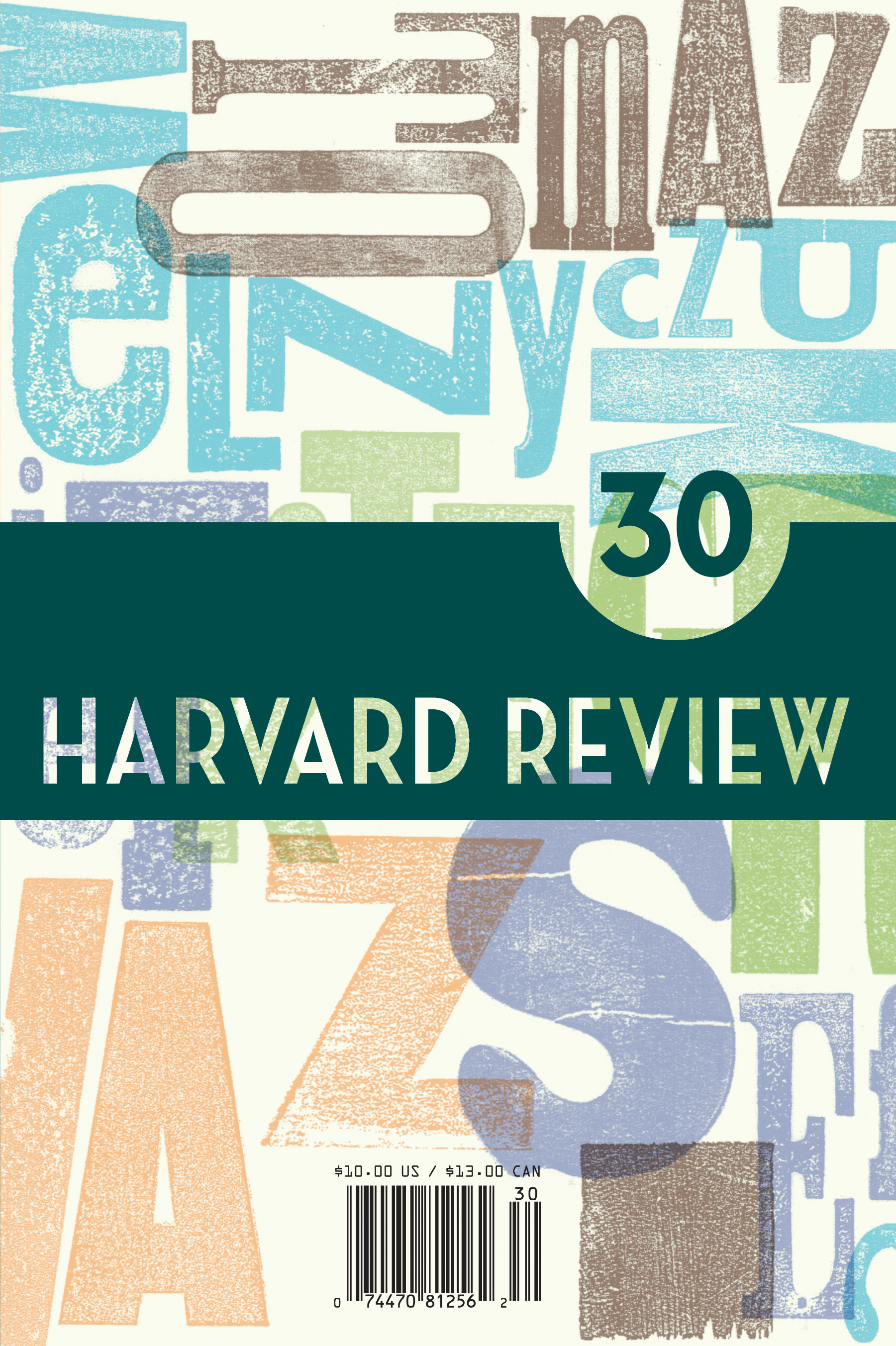HR 30 Editorial
by Christina Thompson
It has been fifteen years since the first issue of Harvard Review was published. Fifteen years is not a long time in the life of a literary journal. The Paris Review was founded in 1953, the Georgia Review in 1947, the Kenyon Review in 1939, and the Yale Review, which describes itself as the Nation’s Oldest Literary Quarterly, traces its history to 1911, or to 1892, or even to 1819, depending on how you look at it. In this kind of company, fifteen years is but a modest anniversary.
And yet, Harvard Review feels more like a journal with a half-century’s worth of history than one imagined into existence in 1992. Its list of contributors includes multiple winners of the National Book Award, the Pulitzer Prize, and the Nobel Prize in Literature: Arthur Miller, Seamus Heaney, Jumpha Lahiri, Gore Vidal, Derek Walcott, Jorie Graham, J. M. Coetzee, Czeslaw Milocz. For the fifth year running one or more of our contributors has earned a place in the Best American series. And dozens of our younger writers have been “discovered” by commercial publishers and the mainstream press and been awarded grants and prizes.
Officially, Harvard Review is the creation of two people both of whom work part-time. In reality, though, it represents the efforts of an army of supporters and volunteers with the backing of a major cultural institution. On this, our fifteenth birthday, we would like to extend our heartfelt thanks to all of these people. Without them there could be no success stories, no propelling of young writers on to great things, no discovery of lost manuscripts by famous authors, no experiments in form, no defense of poetry, no instances of perfect prose, no plays, no essays, no fiction, no fun.
First honors must naturally go to Stratis Haviaras, former curator of the Woodberry Poetry Room and founder of Harvard Review. Under his editorship, Harvard Review established itself as a first-class journal, particularly in the field of poetry. Among his many triumphs are the Elizabeth Bishop issue, the Seamus Heaney monograph, and a chapbook by A. R. Ammons.
Special thanks are also due to Michael Shinagel, Dean of the Division of Continuing Education at Harvard, whose undying support for Harvard Review has has meant a great deal to me. And to William Stoneman, Florence Fearrington Librarian of Houghton Library, for benign and generous oversight of the Review since I took over as editor in 2000. Other individuals who have made a significant contribution to the journal’s success include Geoffrey Movius of the Harvard University Development Office; Grace Dane Mazur, who edited the fiction for the first twelve years; Prudence Steiner, book review editor since 1994; and Don Share, current curator of the Poetry Room and poetry editor of Harvard Review since 2001.
Twice a year, as we ready an issue for the printers, I take a break from the footers and the pagination to think about the issue as a whole. Up until this point it’s really a matter of individual pieces—some that we have pulled out of the mail, some that have been commissioned, maybe one or two held over from a previous season, perhaps something that arrived at the very last minute that we couldn’t resist. Each has its own unique personality (entangled, of course, with that of its author) and by this time in the process my relationship with it is complex. So it requires a certain effort of mind to move away from this intimacy and think more generally about the relationships among the pieces, about the character of the issue overall.
Two things strike me about this, our thirtieth number: first that it is filled with poetry and second that it is filled with writers who work and live within a radius of perhaps ten miles. Harvard Review has always been an international journal with contributors from Europe, Asia, South America, the Pacific, and the Middle East. It is the exception rather than the rule for us to publish so many local writers at one time, but nothing, it seems to me, could be more fitting for our birthday issue. We have the wherewithal to seek out writing on the far side of the world precisely because we are so well supported by a strong and vibrant base of writers here at home.
In this issue, then, we extend our thanks to a literary community that is truly astonishing in its variety and breadth. From Harvard we present the work of two faculty members: Katherine Vaz, a Briggs-Copeland Fellow, and Christie McDonald, chair of the Department of Romance Languages and Literatures. From a little farther down the road we have a story by Askold Melnyczuk, founding editor of Agni and now director of creative writing at the University of Massachusetts, Boston. Also in the issue, an essay by David Ferry, professor emeritus at Wellesley College, and poems by Jenny Barber, editor of Salamander, Steven Cramer, director of the creative writing MFA at Lesley University, Fred Marchant, founder of the Suffolk University Poetry Center, Philip Nikolayev, editor of Fulcrum, and Daniel Bosch, former poetry editor of Harvard Review. Finally, we have drawings by Roger Kizik, who lives a little farther away—all the way down in South Dartmouth—but whom we want to thank for tirelessly seeking out interesting artists in his capacity as Harvard Review’s visual arts editor these past few years.
There are other treasures in this issue: poems by Tomaž Šalamun, an essay on John Cheever, a story by Anthony Varallo, and an essay by Kathryn Rhett, whose manuscript I found at the very bottom of an enormous pile of unsolicited submissions. I blush to say how long it had been there, but I certainly owe her thanks as well, not only for letting us have her flawless essay but for being so understanding as well.
Published on February 19, 2015
First published in Harvard Review 30

